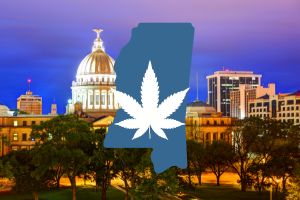Is CBD Flower Legal in Mississippi?
Posted by Tweedle Farms on May 17th 2021

Hemp in Mississippi: A Deep Dive into the State's Emerging Hemp Industry
Mississippi, traditionally known for its rich agricultural heritage and cautious stance on cannabis-related legislation, has recently ventured into the burgeoning field of hemp cultivation and production. This foray is reflective of a broader national movement catalyzed by significant shifts in legislation, particularly the 2018 Federal Farm Bill. This article is an exploration that aims to unpack the legal landscape surrounding hemp in Mississippi, focusing on facets such as CBD flower and other hemp-derived consumer goods, and aims to provide clarity for industry stakeholders and consumers alike.
Setting the Stage: Mississippi's Agricultural Evolution
Mississippi's agricultural sector has long been a cornerstone of its economy, with a history steeped in the cultivation of cotton, soybeans, and rice. The introduction of hemp into this mix represents a significant pivot that aligns with modern agricultural practices and market demands for sustainable and versatile crops.
The 2018 Federal Farm Bill's reclassification of hemp — defining it as a cannabis plant with a THC content of 0.3% or less — marked a watershed moment, legally separating hemp from its psychoactive counterpart, marijuana. This redefinition opened the door for states like Mississippi to explore hemp's agricultural and economic potential.
Mississippi's Regulatory Response
In the wake of federal legalization, Mississippi undertook a careful evaluation of hemp's viability within the state, culminating in the establishment of regulatory frameworks aimed at overseeing hemp cultivation and processing. The Mississippi Department of Agriculture and Commerce (MDAC) emerged as the key regulatory body, tasked with issuing licenses, ensuring compliance with cultivation standards, and overseeing the overall integrity of the state's hemp program.
Exploring the Types of Hemp Flower
Within the broader category of hemp, there are nuances that separate hemp flower, CBD flower, and legally tenuous newcomer, THCA flower.
- Hemp Flower: This term broadly refers to the bud of the hemp plant, known for its rich profile of cannabinoids and terpenes but minimal THC content. Hemp flower is valued for its versatility, finding applications in everything from textiles to health products.
- CBD Flower: A specialized subset of hemp flower, CBD flower is specifically cultivated for its high CBD content and its aesthetic similarity to traditional THC-rich cannabis.
- THCA Flower: This variety represents a complex legal and regulatory challenge. THCA (tetrahydrocannabinolic acid) is a non-psychoactive precursor to THC found in raw cannabis plants. When introduced to heat, it converts to THC and becomes intoxicating. As such, it is effectively the same cannabis that has been bought and sold for millennia, albeit with a 21st century rebrand.
Implications for Mississippi's Stakeholders
For cultivators and producers in Mississippi, navigating the state's regulatory environment is paramount. This entails not only adhering to licensing and cultivation standards but also engaging in proactive measures to ensure that hemp crops remain within the legal THC limit.
On the processing and retail side, the landscape is equally complex, particularly regarding CBD products. The evolving regulatory stance of agencies like the FDA on CBD, especially in consumable products, necessitates a vigilant approach to product development, labeling, and marketing.
Consumer Perspectives and Challenges
As the Mississippi market for hemp-derived products expands, consumers are faced with an increasingly diverse range of options. The onus is on consumers to navigate this landscape with a critical eye, especially as the proliferation of hemp products continues relatively unabated. It’s now possible to find a wide variety of CBD products throughout the state, including pre rolls, CBD gummies, CBD oils, topicals, and more.
Consumers should prioritize products that are transparently labeled, third-party tested, and compliant with state and federal regulations.
Navigating Future Horizons
The path forward for hemp in Mississippi is laden with both opportunities and challenges. Key among these is the need for regulatory clarity, particularly concerning CBD and other hemp-derived products. Stakeholders across the spectrum, from farmers to retailers, are advocating for policies that support industry growth while protecting consumer interests.
Education and research are pivotal in this regard. By investing in hemp research, Mississippi can unlock deeper insights into the crop's agricultural potential, its environmental benefits, and its economic viability. Public education efforts, aimed at demystifying hemp and its derivatives, are equally crucial in building a well-informed consumer base.
Conclusion
Mississippi's entry into the hemp industry represents a significant step forward in the state's agricultural evolution. As stakeholders and consumers alike navigate this new terrain, the collaborative efforts of regulators, industry participants, and educational institutions will be critical in shaping a sustainable and prosperous future for hemp in Mississippi. This journey, while fraught with regulatory and market challenges, holds the promise of establishing hemp as a key player in Mississippi's agricultural and economic landscape.



